In 2025, AI is not just assisting recruiters; it is fundamentally redefining the entire hiring ecosystem. An astonishing 87% of companies worldwide now integrate AI-driven tools into their recruitment processes.
This widespread adoption reflects AI’s undeniable ability to enhance efficiency, reduce costs, and improve the quality of hires.
The global AI recruitment market, valued at a substantial $661.56 million in 2023, is on a steep upward trajectory. Industry experts project it to soar to an impressive $1.12 billion by 2030, exhibiting a robust Compound Annual Growth Rate (CAGR) of 6.78%.
This isn’t merely growth; it’s a clear indicator of AI’s solidified position as a cornerstone of modern talent acquisition.
Over 65% of recruiters have already embraced AI, primarily driven by three compelling benefits: saving precious time (44%), significantly improving candidate sourcing (58%), and achieving substantial reductions in hiring costs—up to 30% per hire.
Yet, this technological leap isn’t without its complexities. A considerable 66% of U.S. adults express reluctance to apply for jobs where AI plays a role in hiring decisions, highlighting an important area for companies to address in terms of transparency and trust.
Let’s explore the critical statistics and insights shaping AI in recruitment today, unraveling how this technology is empowering organizations and transforming candidate experiences.
Top AI Recruitment Statistics for 2026: What You Need to Know Now
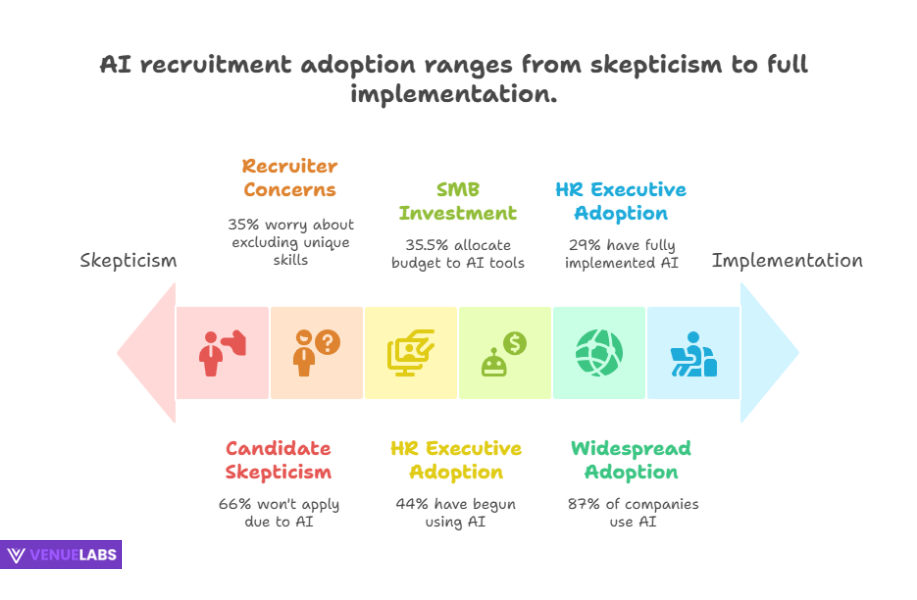
The rapid evolution of AI in recruitment brings forth a wealth of data. Here are some of the most impactful statistics that illuminate its current state and future trajectory:
- Market Growth: The global AI recruitment industry currently commands a market size of $661.56 million as of 2023. Projections indicate a remarkable growth, with the enterprise sector alone expected to expand at a CAGR of 6.78% between 2023 and 2030.
- Widespread Adoption: A staggering 87% of companies actively use AI in their recruitment process. This isn’t limited to large corporations; 99% of Fortune 500 companies leverage AI recruitment tools in some capacity.
- Recruiter Buy-in: More than 65% of recruiters have already used AI to hire people, with 44% citing time savings as a primary reason for adoption.
- Efficiency Gains: An impressive 67% of hiring decision-makers identify time-saving as the main advantage of using AI in recruitment. For candidate sourcing, 58% of AI-using recruiters find it most useful.
- Talent Acquisition: 24% of companies specifically use AI to hire talented employees, showcasing its role in identifying top-tier candidates.
- Talent Management Beyond Hiring: 60% of organizations now use AI to manage talent, extending its reach beyond initial recruitment.
- Small and Medium Business (SMB) Investment: 35.5% of small and medium businesses allocate their budget towards recruiting tools that utilize Artificial Intelligence or machine learning, indicating broader market penetration.
- HR Executive Adoption: 44% of HR executives have begun using AI for recruiting and hiring, with 29% having fully implemented AI solutions.
- Investment in AI Software: Leading recruiting tech companies plan to invest 60% in AI-powered recruiting software worldwide, underscoring future growth.
- Candidate Skepticism: A significant 66% of adults in the United States state they will not apply for a job that uses AI to assist in hiring decisions.
- Bias Concerns: 37% of American adults perceive racial or ethnic bias as a significant problem in the hiring process, and 13% believe AI could worsen it. Conversely, 43% of recruiters believe AI can reduce human bias.
- Recruiter Concerns: 35% of recruiters worry that AI might exclude candidates with unique skills and experiences.
These statistics paint a vivid picture: AI is no longer a niche tool but a fundamental component of recruitment, yet its ethical implications and candidate perceptions demand careful consideration.
- Also read about: AI Market Size Statistics
The Expanding Universe of AI Recruitment: Market Size and Growth
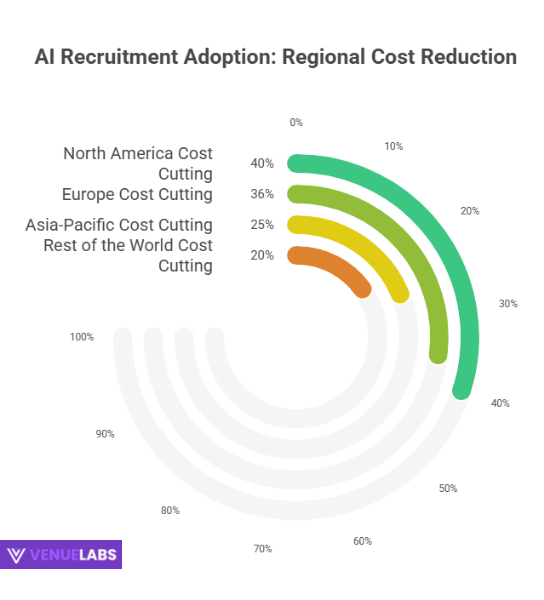
The journey of AI in recruitment from a nascent technology to a global powerhouse is truly fascinating. The market size for AI recruitment continues its impressive growth trajectory, promising a future where AI is deeply embedded in every facet of talent acquisition.
Market Size of the AI Recruitment Industry
Let’s look at the growth of the AI recruitment market:
| Year | Market Size of The AI Recruitment Industry |
| 2020 | $380.6 million |
| 2021 | $470.3 million |
| 2022 | $540.4 million |
| 2023 | $661.56 million |
| 2030 | $1,119.8 million |
The industry saw a substantial increase of over $120 million from 2022 to 2023, reflecting a growth of over 64.45%. This rapid expansion indicates that organizations are quickly recognizing and investing in the value that AI brings to their hiring processes.
Regional Dominance in AI Recruitment Adoption
North America currently leads the charge in utilizing AI for HR processes, achieving a significant 40% cost reduction in 2022.
This region generated $206.4 million in revenue for the global AI recruitment industry in 2022, with projections indicating a rise to $323.2 billion by the end of 2030. Europe closely follows, reporting a 36% cost reduction in the same year.
Let’s examine the regional breakdown of cost-cutting due to AI implementation in HR:
| Region | Cost Cutting |
| North America | 40% |
| Europe | 36% |
| Asia-Pacific | 25% |
| Rest of the World | 20% |
Source: Market Research Future.
The enterprise sector of AI recruitment is a major growth engine, projected to reach $275.2 million by 2030. The IT and telecommunications sectors are also rapidly adopting AI, expected to hit $132.9 million by 2030, while the education sector anticipates reaching $130 million.
This regional and sectoral data underscores the diverse applications and growing economic impact of AI recruitment across the globe.
Recruiter Perspectives: How Professionals View AI in Hiring
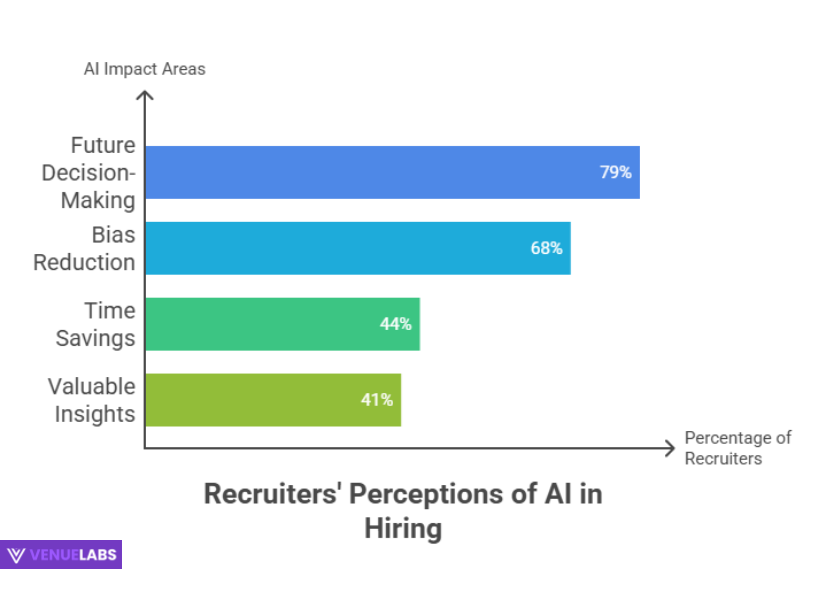
Recruiters are at the forefront of AI adoption, and their perspectives are crucial. While many embrace AI for its efficiency, some also voice concerns.
Optimism and Efficiency: The Upside for Recruiters
- Future Decision-Making: 79% of recruiters believe AI will soon be advanced enough to make hiring and firing decisions.
- Bias Reduction: 68% of recruiters state AI can help remove biases from hiring processes, a significant advantage given that 48% of hiring managers admit to having some form of bias.
- Time Savings: 44% of recruiters highlight saving time as a primary reason for implementing AI.
- Valuable Insights: 41% of recruiters find that AI offers valuable insights, simplifying their jobs (39%).
Concerns and Challenges: The Downside for Recruiters
- Excluding Unique Talent: 35% of recruiters worry that AI may exclude candidates with unique skills and experiences, potentially missing out on unconventional talent.
- Job Security Fears: 26% of recruiters believe AI recruitment could potentially disrupt the HR industry, raising concerns about job displacement.
- Overlooking Qualities: 21% of respondents see the main danger of AI recruitment as its potential to overlook atypical qualities and experiences.
These insights reveal a mixed but largely optimistic outlook from recruiters, who appreciate AI’s benefits while remaining cognizant of its potential drawbacks and the need for human oversight.
The AI Advantage: How Many Are Using It?
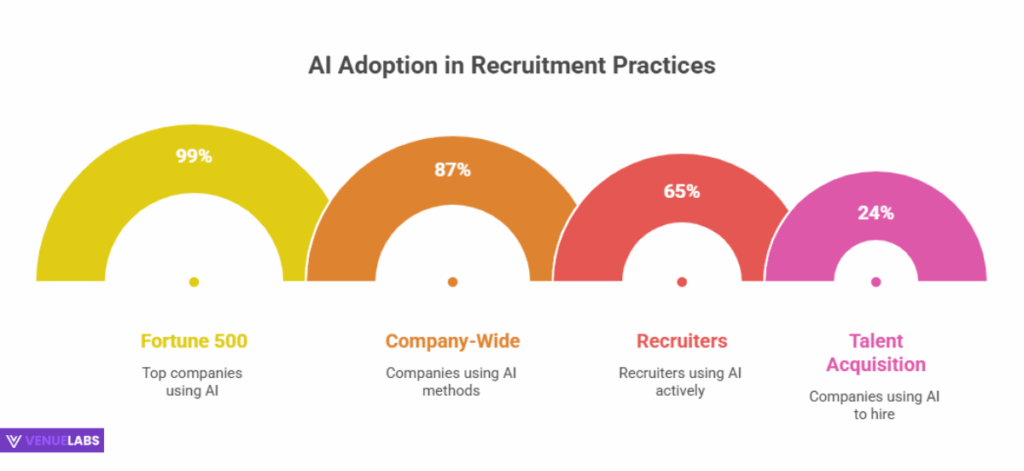
The adoption rates of AI in recruitment are soaring, demonstrating a clear shift in industry practices.
- Company-Wide Adoption: 87% of companies now use AI recruitment practices, with 99% of Fortune 500 companies leveraging these methods.
- Recruiter Utilization: 65% of recruiters actively use AI in their hiring processes.
- Investment in Automation: Over 73% of companies plan to invest in recruitment automation by the end of 2025, fueled by a 54% increase in AI investment compared to 2022, reaching $142.3 billion.
- Talent Acquisition Focus: 24% of companies specifically use AI to hire talented employees, and 89% of HR professionals recognize AI’s potential to improve the applicant application process.
The Tangible Benefits of AI in Recruitment
AI isn’t just about speed; it’s about making better, more informed hiring decisions.
- Higher Interview Success: Candidates selected by AI are 14% more likely to pass interviews and receive job offers. They also show an 18% higher chance of accepting job offers.
- Primary Advantages: 67% of hiring decision-makers cite time savings as the main advantage, while 43% point to AI’s ability to eliminate human biases.
- Faster Hiring Process: 86.1% of recruiters confirm that AI makes the hiring process faster by processing large datasets more quickly.
- Candidate Sourcing and Screening: 58% of AI-using recruiters find it most useful for candidate sourcing, with 56% leveraging it for screening and 55% for nurturing candidates.
| Benefits of AI | Share of Respondents |
| Saves Time | 67% |
| Removes Human Bias | 43% |
| Delivers Best Candidate Matches | 31% |
| Saves Money | 30% |
Source: Statista.
These benefits underscore AI’s role in creating a more efficient, equitable, and effective recruitment landscape.
Navigating the Hurdles: Challenges in AI Recruitment
Despite its advantages, AI recruitment faces significant challenges, particularly concerning candidate trust and potential biases.
- Candidate Opposition: 71% of U.S. adults oppose using AI to make final hiring decisions, with only 7% in favor and 22% unsure.
- Reluctance to Apply: 66% of U.S. adults would avoid applying for jobs that use AI in hiring decisions, citing a lack of personal touch, inability to handle every situation, and potential biases.
- Perceived Ineffectiveness: 15% of U.S. adults believe AI cannot treat all job applications the same way as humans, while 23% think it is less effective at identifying well-qualified applicants. 44% feel AI is not as good as humans at recognizing the potential of applicants who may not perfectly match the job description.
- Racial Bias Concerns: 37% of American adults consider racial or ethnic bias a significant problem in hiring, and 13% believe AI could worsen it. This concern is more pronounced among Black Americans (20%).
- Human Oversight Preference: Only 31% of recruiters let AI decide whether to hire someone, with 75% open to it only if human involvement exists in the process. 25% believe it is entirely unjust to leave such decisions to AI.
These challenges highlight the critical need for transparency, ethical AI development, and robust human oversight to build trust and ensure fairness.
The Current Landscape of AI in Recruitment (2024-2025)
The present state of AI in recruitment shows significant momentum and continued growth.
- Increased AI Tool Usage: From 2023 to 2024, there has been a remarkable 68.1% increase in using AI tools for recruitment.
- Talent Management Integration: 60% of organizations use AI to manage talent.
- Recruitment Campaign Adoption: 30% of organizations currently use AI for their recruitment campaigns.
- Impact on Professionals: 35% of talent professionals and hiring managers report that AI most affects their hiring processes.
- Startup Growth: Over 100 startups are actively developing AI tools for human resource managers, indicating a thriving innovation ecosystem.
The Future of AI Recruitment: Predictions and Trends
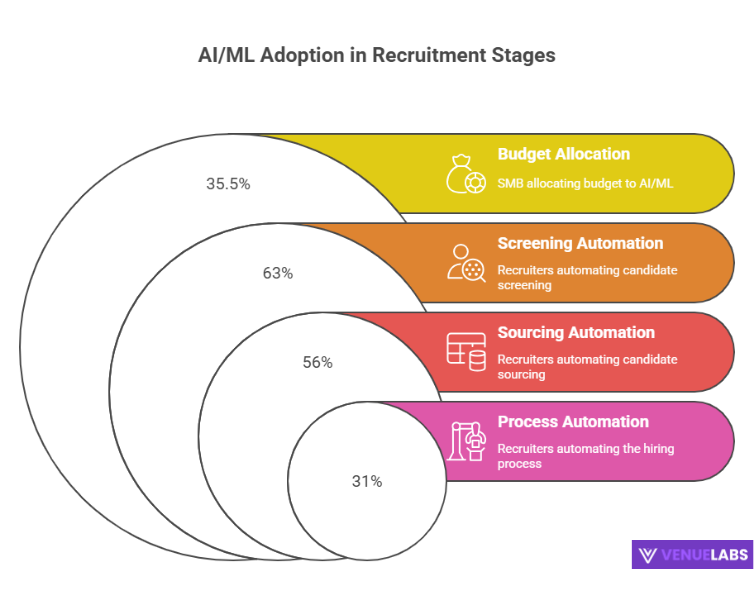
The future of AI in recruitment points towards deeper integration and more sophisticated applications.
- SMB Investment: 35.5% of small and medium businesses are allocating budget toward AI/ML-powered recruiting tools, with enterprises planning the highest allocation.
- Automation of Screening: 63% of recruiters believe AI will replace candidate screening in the future.
- Candidate Sourcing Automation: 56% of recruiters expect AI to replace the searching for candidates on different platforms.
- Partial Process Automation: While 31% of recruiters believe AI will take over the whole hiring process, 15% think it will never replace the human side of recruitment.
| Which Part of the Hiring Process Can Be Replaced by AI | Share of Respondents |
| Screening Candidates | 63% |
| Searching for a candidate on different platforms | 56% |
| Creating job descriptions | 46% |
| Conducting initial interviews | 37% |
| The whole process of hiring AI will take over | 31% |
These trends suggest a future where AI handles repetitive, data-intensive tasks, freeing up recruiters to focus on strategic, human-centric aspects of hiring.
General AI Recruitment Statistics: A Broader View
Beyond specific adoption rates, several general statistics highlight AI’s widespread impact.
- Cost Reduction: AI recruitment can reduce hiring costs by 30% per hire and increase revenue per employee by an average of 4%.
- Perceived Dangers: 21% of respondents see overlooking unique qualities as the main danger, followed by algorithmic bias (18%) and candidates manipulating technology (16%).
| Dangers of AI in The Recruitment Process | Share of Respondents |
| Overlooking atypical qualities and experiences | 21% |
| Algorithmic bias | 18% |
| Candidates manipulating technology to get the job | 16% |
| Aspects overlooked by AI software developers | 16% |
| Applicants drop out of the process because they are uncomfortable with the technology | 14% |
- HR Executive AI Usage: 44% of HR executives have started using AI for recruiting and hiring, with 29% having fully implemented solutions.
- Investment in Sourcing Tools: 91% of tech companies plan to invest in sourcing tools, 86% in employer branding, and 60% in AI-powered recruiting software.
| Tech Companies Want To Invest In | Share of Respondents |
| Budget in sourcing tools/tech | 91% |
| Employer Branding | 86% |
| Talent Team Headcount | 81% |
| Email tools/tech | 79% |
| AI-powered recruiting software | 60% |
These broader statistics reinforce the idea that AI is not just a tool for recruitment but a strategic imperative for overall HR transformation.
Global Adoption of AI in Recruitment
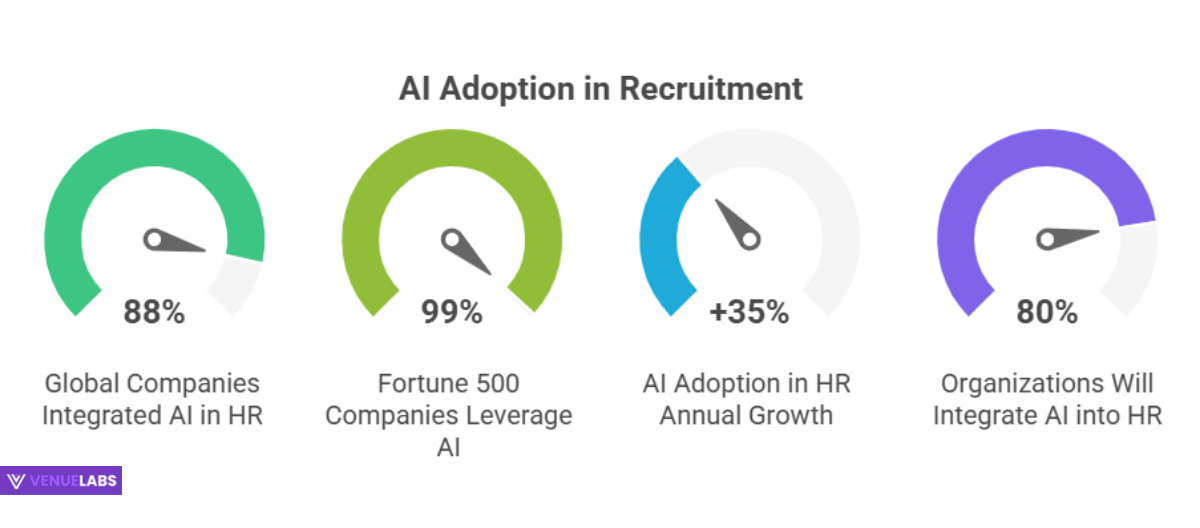
AI recruitment is now a mainstream HR capability, driven by competitive pressures and mature technology.
- Global Integration: 88% of companies globally have integrated AI into HR and hiring functions.
- Fortune 500 Dominance: 99% of Fortune 500 companies leverage AI recruitment tools.
- Annual Growth: AI adoption in HR is expected to grow by 35% annually through 2025.
- Full HR Integration: By 2025, 80% of organizations will integrate AI into HR functions.
Adoption by Region
| Region | Adoption Rate (2024–2025) | Notes |
| North America | 88%+ | Driven by high investment in automation and early regulatory frameworks (NYC AI Hiring Law, Illinois AIVIA). |
| Europe | ~80% | Strong uptake, particularly in GDPR-compliant AI tools for bias monitoring. |
| Asia-Pacific | ~70% | Rapid growth in tech hubs like India, Singapore, and Australia, with emphasis on volume hiring. |
| Rest of World | ~60% | Adoption is growing but constrained by budget and infrastructure limits. |
Adoption by Company Size
| Company Size | AI Recruitment Adoption Rate | Key Drivers |
| Large Enterprise | 90%+ | High hiring volume, strong HR tech budgets, global recruitment needs. |
| Mid-Market | 70–75% | Focus on cost savings and automation for lean HR teams. |
| SMBs | 35–40% | Gradual adoption, often through bundled ATS/HRM software. |
Trends Driving Adoption
- Volume Pressure: Corporate job postings attract approximately 250 resumes per role, creating an unsustainable manual workload.
- Hybrid & Remote Hiring: The shift to global hiring post-pandemic necessitates tools for screening across geographies and managing virtual interviews.
- Competitive Markets: Talent scarcity in specialized fields pushes employers towards AI-driven sourcing and matching.
- Regulatory Momentum: Laws in NYC, Illinois, and EU AI regulations are pushing companies towards transparent and auditable AI tools.
AI Recruitment Market Size & Growth: A Detailed Look
The market’s growth trajectory is a testament to AI’s transformative power.
Global AI Recruitment Market Size & Growth Projections
- 2023 Market Size: $661.56 million.
- 2030 Market Size: Projected to reach $1.12 billion, with a CAGR of 6.78%.
- 2022-2023 Growth: Over 64.45% growth in one year.
- North American Share: North America accounts for 33% of the global market.
- European Growth: Europe expects a CAGR of 6.5% over the next 5 years.
FAQs About AI Recruitment Statistics
1. What is the current market value of the AI recruitment industry, and what are its growth projections?
The global AI recruitment industry was valued at $661.56 million in 2023, and experts project it will reach $1.12 billion by 2030, showing a strong Compound Annual Growth Rate (CAGR) of 6.78% due to increasing adoption and investment in AI tools for hiring.
2. How widely adopted is AI in recruitment processes, and which regions are leading this adoption?
An impressive 87% of companies worldwide currently use AI in their recruitment processes, with 99% of Fortune 500 companies leveraging these tools. North America is leading the adoption, accounting for 33% of the global market share and achieving a 40% cost reduction in HR processes due to AI.
3. What are the primary benefits that recruiters identify when using AI in the hiring process?
Recruiters primarily find AI beneficial for saving time (44%), significantly improving candidate sourcing (58%), and reducing hiring costs by up to 30% per hire. Additionally, 67% of hiring decision-makers highlight time-saving as AI’s main advantage, and 43% note its ability to eliminate human biases.
4. What are the main concerns and challenges associated with AI in recruitment, particularly from a candidate's perspective?
A significant 66% of U.S. adults would avoid applying for jobs that use AI in hiring decisions, citing concerns about a lack of personal touch, potential biases, and AI’s inability to handle every situation. Many also fear that AI might overlook unique skills or exacerbate existing racial biases in the hiring process.
5. How is AI expected to shape the future of recruitment, and what role will human oversight play?
AI is set to deepen its integration into recruitment, with 63% of recruiters believing it will replace candidate screening and 56% expecting it to automate candidate sourcing. While AI will handle repetitive tasks, human oversight remains crucial; 75% of recruiters would only accept AI-driven hiring decisions with human involvement, emphasizing the need for a balanced approach where AI augments human judgment rather than replacing it entirely.
Also Read:
- Google Searches Statistics
- Google Chrome Statistics
- eLearning Statistics
- Mobile Internet Traffic Statistics
- WordPress Statistics
Conclusion
AI is no longer optional for businesses seeking to optimize their talent acquisition. Its continued expansion, as evidenced by its projected market value and increasing integration into HR functions, underscores its importance.
However, to truly harness its power, organizations must navigate the inherent challenges, particularly concerns about bias and the need for human oversight, to build trust and ensure fairness.
The future of recruitment is a collaborative one, where AI handles the routine, data-intensive tasks, empowering human recruiters to focus on strategic insights, candidate engagement, and the nuanced decisions that only a human can make.
Striking this balance is crucial for leveraging AI to its full potential, creating a hiring landscape that is both efficient and profoundly human.
